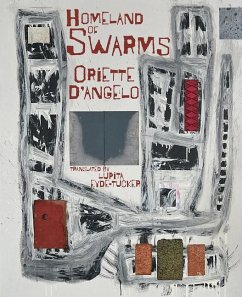A searingly sociopolitical English-language poetry from award-winning Venezuelan poet Oriette D'Angelo, translated by Lupita Eyde-Tucker. At once image-rich, lyrical, and searingly sociopolitical, HOMELAND OF SWARMS (Cardiopatías) is Venezuelan poet Oriette D'Angelo's debut poetry collection in English, translated from the Spanish by Lupita Eyde-Tucker. In her unrelenting, charged poetry, D'Angelo reveals how the diseases and dis-eases of a fraught state infect not only the body politic but also the individual bodies of the citizenry. While the book weaves a tapestry of pain caused by the ills of corruption, scarcity, crime, inflation, and poverty in contemporary Venezuela, it also ponders how individuals can confound societal cancers or wage a worthy struggle against the afflictions--both real and metaphorical--that emanate from the heart of a country to infect, affect, and scar the populace. And yet, HOMELAND OF SWARMS imbues the struggle with a sense of hope and an abiding will to survive despite the odds. Lupita Eyde-Tucker specifically sought politically motivated poetry from underrepresented countries like Venezuela, and she renders D'Angelo's poetry into English with poise and panache. Time and again, Homeland of Swarms blends memory and imagery to draw us into the exigencies and emergencies of contemporary Venezuela and transform us, for, according to D'Angelo, "This book was born from the need to name the pain and the disease from the outside, assuming that the weight of our context affects our bodies." "The diseased body, the diseased state, the diseased poem even. This book is about sickness and pathology but it is also about what happens when being alive is itself a crisis, a crisis with no time frame, with no ending. It's about what happens to the disease and the words we use to depict the disease when we cannot emerge from the emergency. HOMELAND OF SWARMS, Oriette D'Angelo's debut book in English, translated sharply by Lupita Eyde-Tucker, finds a poetry for so many types of illness: the illness of identity, bureaucracy, citizenry, poverty, violence and at the same time the illness of the actual body. The poetry, then, of 'a country is in ruins, ' depicts both the ruined-ness while perhaps positing an aesthetics of survival. Homeland of Swarms is an exciting new book to navigate the contemporary nightmares of the Americas." --Daniel Borzutzky "'Caracas, ' writes Oriette D'Angelo, 'is a woman with a chest full of bullets.' In this urgent collection, at once political and highly personal, D'Angelo brings together body and country: her own female body and her Venezuelan homeland under the abusive yoke of men like Hugo Chavez. These poems, in Lupita Eyde-Tucker's poetically alert translations, feel both like denunciations of Venezuela's twenty-first-century leadership, which has reduced a once-wealthy nation to shambles, and also like elegies for all that has been needlessly destroyed or killed or lost: 'it's the ashes / that remind you of my name.'"--Geoffrey Brock Poetry. Latinx Studies.
